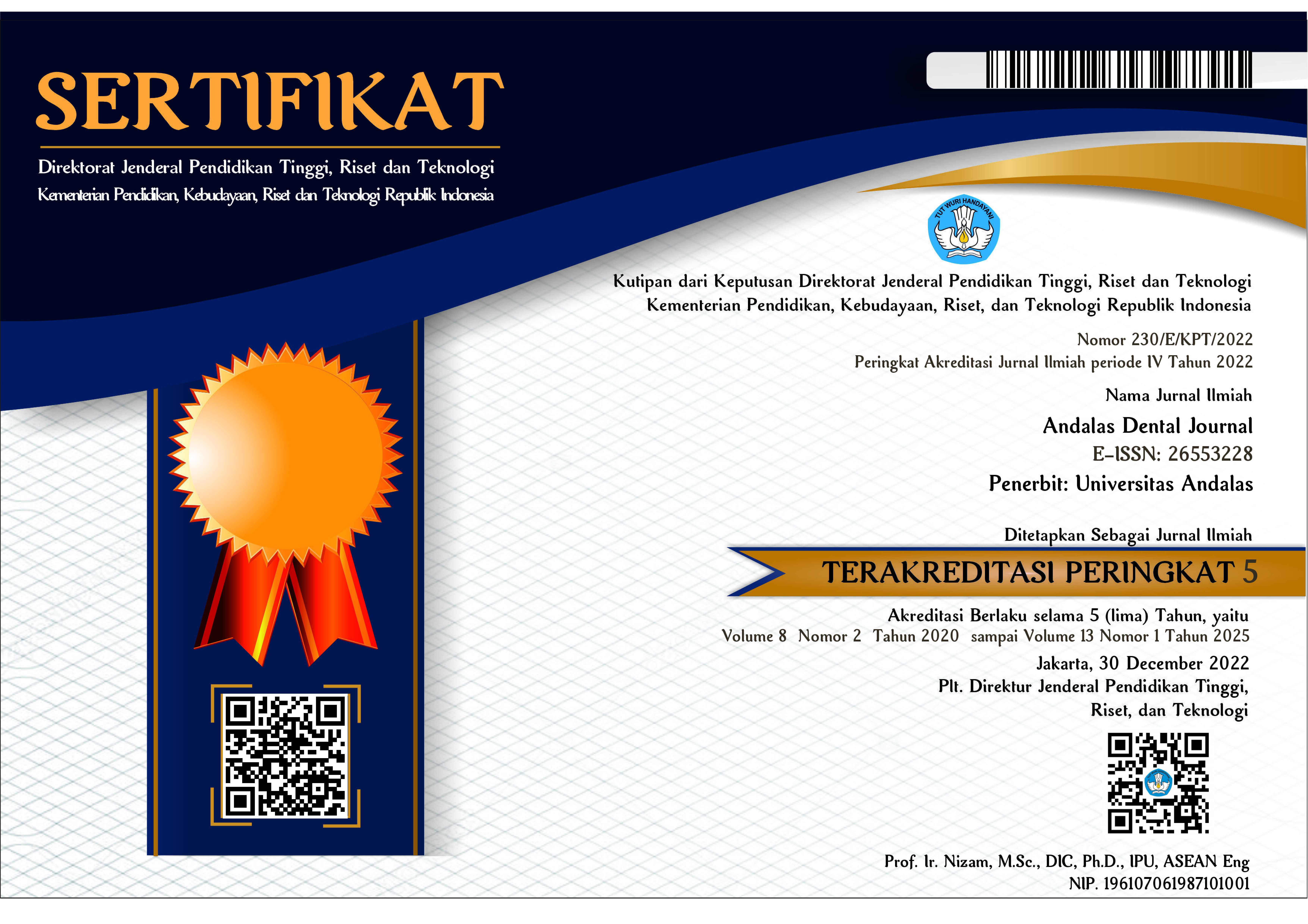PENGARUH WAKTU PENGADUKAN TERHADAP WAKTU GELASI BAHAN CETAK ALGINAT
Abstract
Alginate is one of many dental materials that used for the impressing materials. Mixing time is one of factors
that affected the setting time. The aim of this study was to determine the effect of mixing time at 30 seconds, 35
seconds, 40 seconds, 45 seconds, 50 seconds, 55 seconds and 60 seconds on setting time of alginate. This study
used experimental method. The samples that used were 42 samples and divided into 7 groups of mixing time,
that were 30 seconds (control), 35 seconds, 40 seconds, 45 seconds, 50 seconds, 55 seconds, and 60 seconds.
Setting time was tested with acrylic test rod based on ADA specification no.18. The alginate powder was mixed
with water (10 gr : 23 ml ratio), then put in the mould. Acrylic test rod was placed in contact with the surface of
alginate dough. The setting time was measured from the starting of the mix to the time when alginate does not
adhere to the end of the rod. Result of this study showed that the average of setting time of alginate which mixed
for 30 seconds (control), 35 seconds, 40 seconds, 45 seconds, 50 seconds, 55 seconds, and 60 seconds was
120.17 ± 3.312 seconds, 119.00 ± 1.265 seconds, 118.17 ± 1.472 seconds, 114.83 ± 3.896 seconds, 112.00 ±
1.673 seconds, 109.17 ± 0.983 seconds, and 105.33 ± 4.082 seconds respectively.
One Way Anova test shows significant difference among all experimental group with p=0.000. The change of
setting time alginate show significant difference with control group when it mixed for 45 seconds, 50 seconds, 55
seconds, and 60 seconds.
Keywords: alginate, mixing time, setting time
References
O’Brien WJ. 2002. Dental materials and their selection 3rd ed. Chicago: Quintessence, hal 173-176
Gaurav Solank.,Sumeet Sharma. 2014. A review on alginat impression material. Journal of Pharmaceutical Biology vol 4(3), hal 155-157
Lyra, Edu. 2000. Alginat Impression. Available from URL : lyra.ifas.ufl.edu/ LyraServlet?command=display&port=2050&style=Dentistry%20Navigator%20Frame%20Style&content=3518&class=3519&module=3518&parent0=Dentistry
Marcia (Gladwin) Stewart, R.D.H., Ed.D. 2001. Clinical aspects of dental material theory,practice and cases.4th ed. Morgantown: West Virginia, hal 117-118
Nandini VV, Venkatesh KV, Nair KC. 2008. Alginate impressons : a practical prespective. Journal conservative dentistry vol 11, hal 37-41
Annusavice KJ. 2003. Phillips’ science o f dental materials 11th ed. St. Louis: Elsevier, hal 242
Craig RG., Powers JM. 2002. Restorative dental materials 11th ed. St Louis: CV Mosby Co., hal 280;283
8.Annusavice KJ. 2004. Phillips’ science of dental materials 10th ed. Jakarta: EGC, hal 103-110
Ellis G. 2014. Alginate Impression and Diagnostic Study Model Techniques. ADA CERP. [internet]. Available from URL:http://www.dentalcare.com
Decky J.Indriani.,Niti Matram. 2013. Changes in setting time of alginat impression material with different temperatur.Dental Journal Universitas Airlangga vol 46, p 5-8. [internet]. Available from URL : journal.unair.ac.id/changes-in-
setting-time-of-alginate-impression-material-with-different-water-temperature-article-6117-media-2-category-3.html
Dyah I.,Siti S. 2009. Functional relationship of room temperatur and setting time of alginat impression material.Dental Journal Universitas Airlangga vol.42,p 137-140. [internet]. Available for URL : http://journal.unair.ac.id/functional- relationship-of-room-temperature-and setting-time-of-alginate-impression- material-article-3004-media-2-category 3.html
Melisa TP.,dkk. 2009. Setting time due to alginat impression materials w/p ratio reduction.Material Dental Journal Universitas Airlangga vol.1 hal 37-40
Hidayat AA. 2011. Metode penelitian keperawatan dan teknik analisis data. Jakarta : Salemba Medika















